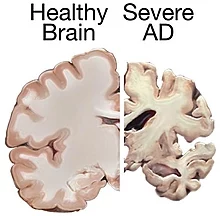With the family of Bruce Willis releasing news that the famous actor has been diagnosed with dementia, we take a deep dive into what dementia is.
Dementia is a general term used to describe a decline in cognitive function, including memory loss and difficulties with thinking, language, and problem-solving. It is not a specific disease, but rather a collection of symptoms that can be caused by various underlying conditions.
Dementia can be caused by a range of factors, including Alzheimer’s disease, Parkinson’s disease, Huntington’s disease, vascular disorders, traumatic brain injury, and infections such as HIV and Creutzfeldt-Jakob disease. Symptoms of dementia may include forgetfulness, confusion, difficulty with language, disorientation, mood swings, and behavioral changes.
While there is no cure for dementia, early diagnosis and treatment can help to slow down the progression of symptoms and improve the quality of life for those affected. Treatment may involve medications, lifestyle changes, and support from healthcare professionals, caregivers, and family members.
How does one diagnose dementia?
Diagnosing dementia can be a complex process that involves multiple steps. Here are some of the steps that doctors typically take when evaluating a patient for possible dementia:
Medical history: The doctor will ask about the patient’s medical history, including any current or past medical conditions, medications, and family history.
Physical examination: The doctor will perform a physical examination to assess the patient’s overall health, including their cognitive function, reflexes, and motor skills.
Cognitive and memory tests: The doctor may use a series of tests to evaluate the patient’s cognitive function, memory, and problem-solving skills.
Brain imaging: Imaging tests such as a CT scan or MRI can be used to detect any physical changes in the brain that may be causing the symptoms.
Laboratory tests: Blood tests can help identify any underlying medical conditions that may be contributing to the symptoms.
Once the doctor has completed these steps, they will typically use a set of diagnostic criteria to determine whether the patient has dementia and, if so, what type of dementia it is. These criteria may vary depending on the specific type of dementia and the organization or healthcare system providing the diagnosis.
How to help someone diagnosed with dementia?
If someone you know has been diagnosed with dementia, there are several things you can do to help them:
Be patient and understanding: Dementia can cause changes in behavior and personality, so it’s important to be patient and understanding with your loved one.
Provide emotional support: People with dementia may experience anxiety, depression, and other emotional changes. Be there to offer emotional support and comfort when they need it.
Help them stay organized: People with dementia can become easily overwhelmed, so help them stay organized with things like schedules, calendars, and to-do lists.
Encourage physical activity: Regular exercise can help to improve mood, cognitive function, and overall health, so encourage your loved one to stay active.
Provide a safe environment: Dementia can affect judgment and spatial awareness, so it’s important to provide a safe environment that’s free from hazards.
Offer assistance with daily tasks: As dementia progresses, your loved one may need help with daily tasks like bathing, dressing, and preparing meals.
Consider professional support: There are many professionals who can help with dementia care, including doctors, nurses, social workers, and occupational therapists. Consider reaching out to these professionals for additional support.
Remember that caring for someone with dementia can be challenging, but it’s important to take care of your own needs as well. Don’t hesitate to seek support from friends, family, and professionals if you need it.
Is dementia preventable?
While there is no surefire way to prevent dementia, there are several lifestyle choices that can help to reduce the risk of developing it. Here are some things you can do to promote brain health and potentially reduce the risk of developing dementia:
Exercise regularly: Regular physical activity has been shown to reduce the risk of cognitive decline.
Eat a healthy diet: A diet that is rich in fruits, vegetables, whole grains, lean proteins, and healthy fats can help to promote brain health.
Stay mentally active: Engage in mentally stimulating activities like reading, puzzles, and learning new skills.
Manage chronic health conditions: Chronic conditions like high blood pressure, diabetes, and high cholesterol can increase the risk of cognitive decline. Work with your healthcare provider to manage these conditions effectively.
Get adequate sleep: Poor sleep quality has been linked to cognitive decline, so prioritize getting enough restful sleep.
Limit alcohol and tobacco use: Heavy alcohol consumption and smoking can both increase the risk of cognitive decline.
Maintain social connections: Social isolation and loneliness can increase the risk of cognitive decline, so stay socially active and connected with others.
It’s important to note that not all cases of dementia are preventable, as some cases may be caused by genetic factors or other medical conditions. However, adopting healthy lifestyle habits can help to promote overall health and potentially reduce the risk of developing dementia.

